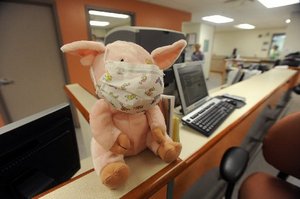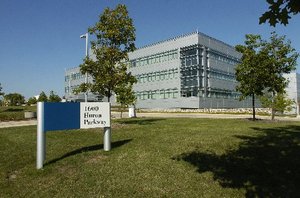Top 9 Washtenaw County health stories from 2009

University of Michigan's Eva Feldman, right, and A. Alfred Taubman discuss an announcement that U-M will begin receiving embryos, more than a year after Michigan voters passed a measure relaxing stem cell research laws in the state. Tina Reed | AnnArbor.com
Here's a look at the top health stories of 2009:
1. University of Michigan and a consortium of state university researchers ramp up for embryonic stem cell research
In December, U-M announced it could finally begin receiving unused embryos and begin deriving new stem cell lines from those embryos after receiving its final approvals.
The announcement came more than a year after voters approved a measure in late 2008 to allow the research, and after months of preparation and development of a program to derive new cell lines. The changes helped earn at least $6.8 million in research grants from the federal stimulus program and attracted the World Stem Cell Summit to Detroit in 2010.
2. Washtenaw County begins distribution of swine flu vaccine, and hospitals deal with influx of patients after months of anticipation about pandemic flu
A new and particularly concerning strain of the flu was first identified in Mexico last April, and within months, the World Health Organization had declared a global pandemic of the swine flu. That flu, also known as the H1N1 flu, had Washtenaw County health officials scrambling throughout the summer to prepare for the illness and create plans to best contain its spread and handle the worst cases in local hospitals.
By late October, the county began distributing its first doses of the H1N1 flu vaccine at a mass vaccination clinic that was quickly overwhelmed by county residents. By the end of the year, vaccinations became more widely available through physicians offices and by appointment at the county’s offices.

A stuffed toy pig wearing a protective mask sits on the desk of the nurses station to lighten the mood in St. Joseph Mercy Hospital's pediatric emergency room. Lon Horwedel | AnnArbor.com
3. Concern about lack of access to health care for local residents increases as Washtenaw Health Plan closes enrollment
The Washtenaw Health Plan insurance program for low-income Washtenaw County residents, also known as the Plan B program, closed enrollment in May after reaching 8,300 patients. The 7-year-old program created to cover primary care visits, outpatient lab tests and other services was designed to cover only 7,000 participants. The state’s Plan A program also closed in May. In the meantime, local hospitals are reporting near record rates of uncompensated care, and Ann Arbor area safety net providers say they're being strained from demand. At last count, the county estimated 35,000 residents were uninsured, but it’s believed the actual number is much higher.
4. Health care reform debate heats up at home
As Democrats in Congress headed home during their recess in August to sell the health care reform bill at town hall-style meetings, the debate grew increasingly heated. Milan resident Mike Sola made state and national headlines when he verbally confronted Congressman John Dingell, D-Dearborn, at a meeting in Romulus during one of these meetings over the reform bill. Congress continues to work on reconciling two versions of a potential health care reform measure.

One of the buildings at 1600 Huron Parkway, the former Pfizer campus, is now owned by the University of Michigan and will be called the North Campus Research Complex. Lon Horwedel | Ann Arbor.com
5. U-M’s acquisition of former Pfizer property finalized, transition to new research facility begins
Using funds almost complete from it’s own Health System reserves, U-M closed a deal to purchase the former pharmaceutical facility for $108 million in June. Medical school dean James Woolliscroft is overseeing the transition to the new North Campus Research Complex, which will have implications in many areas of research for U-M, most certainly for biomedical research. It’s expected laboratories could begin to open there in early 2010.
6. Chelsea Community Hospital officially becomes part of St. Joseph Mercy Health System
Nearly a year after first announcing Chelsea Community Hospital would become the seventh hospital in St. Joseph Mercy Health System, a deal was finally reached finalizing the agreement in May. That included St. Joseph Mercy’s plans to implement information technology and to provide access to resources and expertise at the health system at Chelsea. The health system also endowed $25 million to the Chelsea Area Wellness Foundation, created as part of the merger, to support community health improvement initiatives in Chelsea.
7. Washtenaw County hospitals remain firm on guidelines, despite new mammogram recommendations
A government task force made shock waves when it announced recommendations in November that women should not begin receiving routine, annual mammograms until they reach their 50’s. It was a reversal from guidelines which had been in place for years, calling for women to begin routine screening when they reached their 40’s. Ann Arbor area clinicians said the announcement would likely not impact their screening practices for women, but raised concern about what it might mean for payers covering routine testing for women in the future. Other government agencies also publicly disputed the recommendations from the task force.
8. New smoke-free law is passes and local business work to adjust
The Michigan legislature passed a bill banning smoking in all bars and restaurants, except casinos and cigar bars in Michigan, in December. The measure won strong support from groups like the Great Lakes Division of the American Cancer Society, but met opposition from restaurant groups. Some Ann Arbor area restaurants remain concerned about the impact the change may have on their business when the measure takes effect in May.
9. Medical marijuana industry takes root, but still faces challenges
Even though voters approved a measure legalizing medical marijuana, how it would work was hazy. The Michigan Department of Community Health was given the task of overseeing the state's new medical marijuana program, which is based around a "caregiver and patient" system. But even as more Ann Arbor residents take advantage of the law as registered patients and caregivers, many in the state complained police were still cracking down on registered drug use. In October, advocates marched in Lansing to protest continued raids by police. In the fall, it was announced the federal government would pull back on cracking down on medical marijuana in states where programs had been developed.
Tina Reed covers health and the environment for AnnArbor.com. You can reach her at tinareed@annarbor.com, call her at 734-623-2535 or find her on Twitter @TreedinAA.

